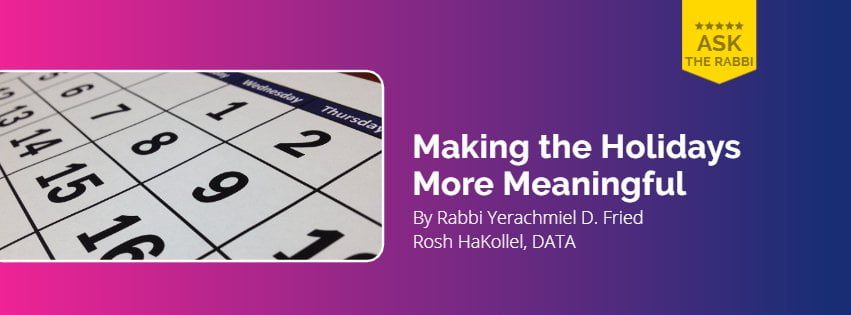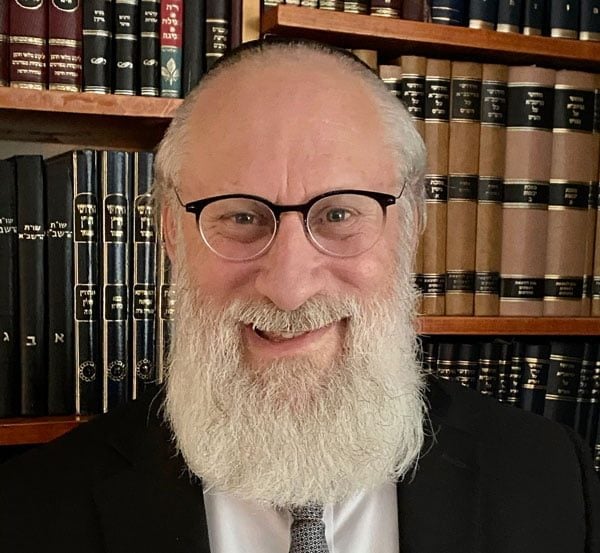Ask the Rabbi: Making The Holidays Meaningful Throughout the Year

Dear Rabbi,
I feel I’ve gained more from this High Holiday season than previous years, probably because I’ve been taking classes this year and have learned a lot about the holidays before they came. I guess I sort of feel on a “high” from it all. But I know it will not last long and I would like your advice what to do to keep this feeling alive until next year.
Wendy L.
Dear Wendy,
I’m so glad to hear about your experience this year. Learning is truly the best preparation for making the holidays meaningful, as we have mentioned many times in this column. It is like preparing the appropriate receptacle to receive energy and emit light.
Your question, how to retain the level you have achieved, I once heard posed by a leading rabbi in Jerusalem. The answer he offered at the time, based upon a tradition he received from previous generations, is through thoughtful, meaningful observance of Shabbos, the Jewish Sabbath.
Shabbos is one day a week when our mundane pursuits come to a halt, leaving us time for spiritual introspection. This is a well-known concept. What this rabbi added was that Shabbos can specifically be utilized to take stock, on a weekly basis, of one’s spiritual state vis-à-vis the heights one achieved during the High Holidays. By using the day for learning, thinking and celebrating the Almighty’s creation, one is able to not only hold onto, but even transcend the High Holidays by continuing to escalate their affect throughout the year.
The High Holidays, as incredible as they are, are still an island in time. Shabbos enables us to stretch that island into the rest of the year, reflecting on those lofty concepts of Rosh Hashanah, Yom Kippur, Sukkos and Simchas Torah, and make them part of our everyday lives. In that way, the week itself begins to revolve around Shabbos, making the next Shabbos even greater than the one before it, and so on. With a year like that, imagine what the next High Holidays will look like!
A leading rabbi, Rabbi Simcha Wasserman, escaped the Holocaust and eventually settled in Los Angeles. In those years in California he began an outreach movement, holding mini-Shabbatons in people’s homes. Before one Shabbaton began, he visited the host’s home to make sure everything was in order and noticed there was no “cholent” cooking.[1]
He asked the hostess, “where’s the cholent”? She answered, “what cholent”?! Said R’ Wasserman, “you surely can’t have a meaningful Shabbos without cholent”! The woman replied, “I’ve been away from Europe so long, I don’t even remember how to make it”. So the Rabbi brought her to the grocery store, they bought the beans, barley, meat and potatoes, came home and put the cholent on the fire. The Rabbi, now satisfied, left to return later that night.
At nightfall all the guests began arriving. The hostess’ best friend, her next-door neighbor, came in… and after a moment turned white as a ghost and ran out of the house. The hostess chased after her, saying it will be a wonderful Shabbos, please stay; but to no avail. She was perplexed as to what had happened to her friend but had no time to deal with it with a house full of people.
As soon as Shabbos was over and the guests left, the hostess ran next door to her friend to see what happened, telling her she missed such a wonderful affair.
The friend answered, “you well know that I am a survivor and have forgotten everything from before the camps. I have forgotten my city, family, friends and past. I’ve gone for hypnosis, shock therapy and many other methods; nothing could bring back my memories. When I came into your home and smelled the cholent, suddenly everything came back. I saw my mother cooking the cholent, our Shabbos table, my city, my friends. I needed to be on my own just to sort it all out!”
When R’ Wasserman heard what had happened, he smiled and proclaimed, “often our Jewish memories have stopped at some point, and it just takes a good cholent to bring them back!”
With an enjoyable Shabbos experience, you, too, can keep your memories and feelings of the High Holidays alive throughout the year!
[1] Cholent is a Jewish traditional hot stew that cooks overnight on Friday and is eaten on Shabbos day. See entry “Cholent” for the source of this custom.




